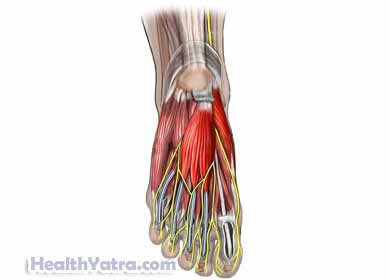Definition
Morton’s neuroma is an inflammation of the nerves in the foot that go to the toes. Although the name includes the word “neuroma,” it is not really a tumor. It can affect any of the toes in the foot. However, it most often affects the nerves that run between the third and fourth or second and third toes.

Causes
Morton’s neuroma is an inflammation caused by a buildup of fibrous tissue on the outer coating of nerves. This fibrous buildup is a reaction to the irritation resulting from nearby bones and ligaments rubbing against the nerves.
Irritation can be caused by:
- Wearing shoes that are too tight
- Wearing shoes that place the foot in an awkward position (eg, high heels)
- A foot that is mechanically unstable
- Repetitive trauma to the foot (such as from sports activities like tennis, basketball, and running)
- Trauma to the foot caused by an injury (such as a sprain or fracture)
It is unusual for more than one Morton’s neuroma to occur on one foot at the same time. It is rare for Morton’s neuroma to occur on both feet at the same time.
Risk Factors
Factors that increase your chance for Morton’s neuroma include:
- Sex: female
- Wearing narrow and/or high-heeled shoes
- Obesity
- Injuries to the foot
- Activities that cause repetitive trauma to the foot (such as sports-related activities)
Symptoms
Symptoms of Morton’s neuroma include the following sensations, usually between the third and fourth or (less often) second and third toes:
- Burning, pain, tingling, and numbness often shooting into the toes
- Discomfort that is worse while walking
- Feeling of a lump between the toes
- Symptoms are usually temporarily relieved when a person:
- Takes off their shoes
- Flexes their toes
- Rubs their feet
Diagnosis
The doctor will ask about your symptoms and medical history. A physical exam will be done. Initial diagnosis of Morton’s neuroma is based on your description of the type and location of pain and discomfort in the foot. The diagnosis will be confirmed by:
- Physical exam of the foot, including:
- Checking for mechanical abnormalities in the foot
- Squeezing the side of the foot, doing so will usually cause pain when Morton’s neuroma is present
- Examination of your shoes to:
- Check for excess wear in parts of the shoe
- Check to see whether the shoes are too tight
- If the diagnosis is still in doubt, an x-ray may be done to rule out another cause of the pain (eg, fracture)
- An ultrasound may be used to visualize the neuroma
- Injections of local anesthetic can be used for diagnosis
Treatment
Treatments may include:
Rehabilitation Measures to Reduce Nerve Irritation
- Switching to low-heeled, wide-toed shoes with good arch support
- Wearing padding in the shoes and/or between the toes
- Wearing shoe inserts to correct a mechanical abnormality of the foot
- Ultrasound, electrical stimulation, whirlpool and massage
Injection of Medication
Injecting the foot with corticosteroids mixed with a local anesthetic in order to reduce pain. Relief may be only temporary, however, if the mechanical irritation is not also corrected. Injections with other types of medications such as alcohol, phenol or even vitamin B12 are sometimes used.
Surgery
Surgery to remove the neuroma may be recommended if more conservative treatment does not solve the problem. While surgery usually relieves or completely removes the symptoms, it often leaves a permanent numb feeling at the site of the neuroma.
Prevention
Steps to help prevent Morton’s neuroma include:
- Avoid wearing tight and/or high-heeled shoes.
- Maintain or achieve ideal body weight.
- If you play sports, wear roomy, properly fitting athletic footwear.
